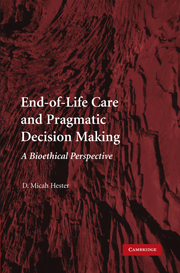4 - Needing Assistance to Die Well
PAS and Beyond
Published online by Cambridge University Press: 05 June 2012
Summary
People die the way they live. I heard this many times from those who struggled for a simple answer to my prying questions.…“If you understood my life,” they'd say, “you'd understand my death.”
Lonny ShavelsonTo understand with one's heart the pain of others is an attribute of the Divine.
Ronald ValdiserriIn Chapter 3, I argued that there are conditions under which some few persons may find that their dying experiences place tragic obligations on them. While the locus of moral concern in that chapter revolved around the patient (as it does in every chapter), there has been important acknowledgement throughout that a radically empirical take on values and meaning implicates others as well. This chapter extends the moral implications of our account of significance and obligation for end-of-life care. This “extension” comes by way of a focus on experience within a context familiar in medicine, and yet resides at the margins of individuality and society – situations that involve the issues of euthanasia and assisted suicide. In particular, I wish to explore two aspects of the dying process and our attitudes toward meaningful acts of dying through suicide, assisted suicide, and euthanasia: (1) why and how some of us might wish to die differently, and (2) why and how those of us involved with dying persons might help in their dying processes.
- Type
- Chapter
- Information
- End-of-Life Care and Pragmatic Decision MakingA Bioethical Perspective, pp. 59 - 91Publisher: Cambridge University PressPrint publication year: 2009



